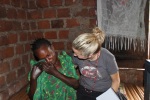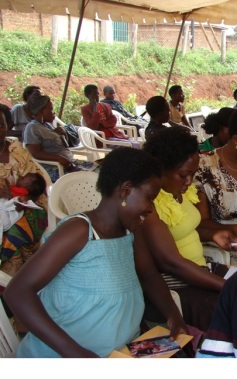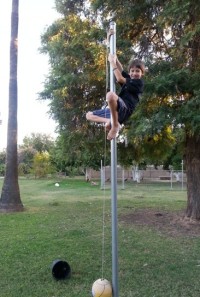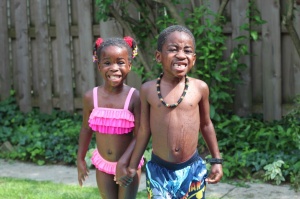I am “for” adoption. I think we established that in my last post. But as I referenced there, I’m only for adoption when adoption is necessary. The last resort. Sometimes.
I’m FOR families. And first families are, well, the FIRST families. I believe that birth mothers are due deference. I believe that wherever possible, they have the inherent right to parent their children. We do not. I’m not at all threatened by appropriate deference to birth mothers. After all, isn’t that how God designed it? We birth children who we then parent. It’s kind of the natural order of things.
But I don’t think that means there isn’t a place for adoption and I don’t think it means that adoption is “unnatural.” To the contrary, I believe adoption is a necessary piece of God’s plan in this fallen world. Sometimes, the last resort must come into play. Sometimes, we do get to support a child who has no one else. Sometimes, we have the incredible opportunity to love as our own the child of another woman’s womb. The question is: when is “sometimes”?
In the United States, sometimes happens in the Foster Care system when a court of law has determined that two parents are unfit to parent. Once parental rights are terminated, those children are orphans under the law and need parents. The child did not do anything wrong in this situation; parental rights are not terminated because a child is a delinquent. Typically, bad things have happened and no amount of intervention has righted the wrongs; new parents are needed. Sometimes, arises in the foster care system. Would you consider being the answer for a child who needs parents in our foster care system?
In private U.S. adoptions, birth parents can choose to place their child for adoption for a host of reasons including their age, health, poverty, number of children, the circumstances of their conception, the health of the child, and innumerable other reasons. Or for no reason other than, “We don’t want to parent.” In those cases where coercion or pressure is not a part of the adoption placement decision, children may need parents as a result of a private placement. Sometimes. The key here is to ensure that none of the parties was coerced into agreeing to relinquish their parental rights. Their rights. It’s no surprise to me that at least 50% of mothers who *think* they will place their child for adoption before the child’s birth, change their minds once the child is born. And thank God. No mother should be forced to say good-bye to a child that they want to parent, absent abuse/neglect and subsequent intervention by a court. {I know well the devastation that comes from a lost adoption placement. This paragraph is not at all intended to be insensitive to those prospective parents who have lost referrals. We grieve with you.} Once a social worker and a court of law have determined that the child has been freely and voluntarily relinquished, a child becomes available for adoption. Sometimes can happen through private U.S. adoption agencies. Would you consider parenting a child through private adoption?
International adoption has recently been highly criticized in both the media and through popular literature. In many cases, appropriately so. Sometimes children born in other countries need to be adopted by families in the U.S., but many times, they do not. The world of international adoption is fraught with challenges and, unfortunately, corruption. But even as I say that, please hear this: I have two children who were born in Uganda. They needed a family. Sometimes international adoption is appropriate. And necessary. However, I believe that we, Church, have to be thoughtful about when “sometimes” happens.
Of the estimated 17.9 million double orphans worldwide, many of them are not available for adoption because they are being cared for by extended family of their deceased parents, just like they would be here if tragedy struck. I’m deeply concerned when I hear the Church criticize this method of caring for orphaned children, particularly when it is precisely how we would do so. Why do we believe that we, strangers from a different culture, can parent better than a biological relative of an orphan in the absence of evidence of abuse or neglect?
Even children who are in orphanages are often not available for adoption. In fact, far less than half of the children in orphanages in Uganda need a home or a family. In many developing countries, like Uganda, families may place a child in an orphanage because they cannot support the child financially for a season of life. While I do not support institutional care for any child, {indeed, we stopped the use of institutional care in the U.S. decades ago} I also cannot support the adoption of a child who has family and may even have family who regularly visits him/her at the orphanage. And yet, I know first-hand of instances where children who were not placed in orphanages for adoption were offered to interested-Westerners for adoption. This is not okay.
I am devastated each time I hear that a child who has been matched with an adoptive family dies while waiting for a family to arrive. It’s heartbreaking on so many levels my brain cannot process it. Nevertheless, I do not favor speed in the International adoption process because the system is ripe for corruption. I think of it like this: would I be willing to sacrifice my child to strangers in another country thousands of miles away so that other children in need could find homes? No, I would not. That is precisely what we are asking the victim of child trafficking to do when we place the value of her child and her relationship below the value of other children who may need to be adopted. Above all, adoptions must be ethical, even if it means that the process is slower. Because imagine that was you. Imagine you were tricked or duped into relinquishing a child. Imagine if you thought your child was going to school and later learned that he was living in a different country and calling different people mom or dad. Imagine being told your child was leaving for HIV treatment and learning that instead, she had been placed for international adoption. Or imagine how you would feel if you learned from the child you adopted that he has a mom. And a dad. And that he remembers the day he was taken from them. Heaven help us.
Sometimes international adoption is necessary and appropriate. We, Church, cannot be involved in the grey areas because devastating a birth family in our quest to address the orphan crisis (largely made up of older or special needs children) is not what any of us set out to do. Let’s not allow our love, passion and emotion for children to cloud our understanding of which children need families and which do not. In those situations where children do need a family, are you willing to be their sometimes?
–Deb Steiner
![gertrudejoy[1]](https://projecthopeful.files.wordpress.com/2014/03/gertrudejoy1.jpg?w=150&h=112)





![IMG_3563_(1024x683)[1]](https://projecthopeful.files.wordpress.com/2014/01/img_3563_1024x6831.jpg?w=150&h=99)













